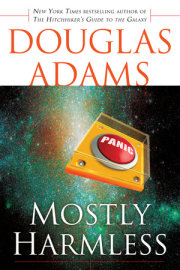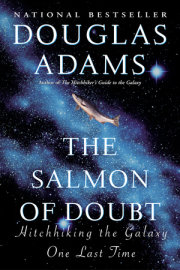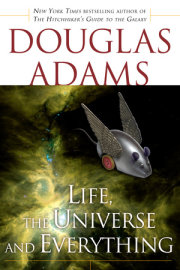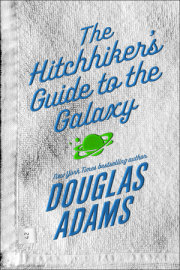Chapter 1
The history of the Galaxy has got a little muddled, for a number of reasons: partly because those who are trying to keep track of it have got a little muddled, but also because some very muddling things have been happening anyway.
One of the problems has to do with the speed of light and the difficulties involved in trying to exceed it. You can’t. Nothing travels faster than the speed of light with the possible exception of bad news, which obeys its own special laws. The Hingefreel people of Arkintoofle Minor did try to build spaceships that were powered by bad news but they didn’t work particularly well and were so extremely unwelcome whenever they arrived anywhere that there wasn’t really any point in being there.
So, by and large, the peoples of the Galaxy tended to languish in their own local muddles and the history of the Galaxy itself was, for a long time, largely cosmological.
Which is not to say that people weren’t trying. They tried sending off fleets of spaceships to do battle or business in distant parts, but these usually took thousands of years to get anywhere. By the time they eventually arrived, other forms of travel had been discovered which made use of hyperspace to circumvent the speed of light, so that whatever battles it was that the slower-than-light fleets had been sent to fight had already been taken care of centuries earlier by the time they actually got there.
This didn’t, of course, deter their crews from wanting to fight the battles anyway. They were trained, they were ready, they’d had a couple of thousand years’ sleep, they’d come a long way to do a tough job and, by Zarquon, they were going to do it.
This was when the first major Muddles of Galactic history set in, with battles continually reerupting centuries after the issues they had been fought over had supposedly been settled. However, these muddles were as nothing to the ones which historians had to try and unravel once time-travel was discovered and battles started preempting hundreds of years before the issues even arose. When the Infinite Improbability Drive arrived and whole planets started unexpectedly turning into banana fruitcake, the great history faculty of the University of MaxiMegalon finally gave up, closed itself down and surrendered its buildings to the rapidly growing joint faculty of Divinity and Water Polo, which had been after them for years.
Which is all very well, of course, but it almost certainly means that no one will ever know for sure where, for instance, the Grebulons came from, or exactly what it was they wanted. And this is a pity because, if anybody had known anything about them, it is just possible that a most terrible catastrophe would have been averted — or, at least, would have had to find a different way to happen.
“Click, hum.
The huge gray Grebulon reconnaissance ship moved silently through the black void. It was traveling at fabulous, breathtaking speed, yet appeared, against the glimmering background of a billion distant stars to be moving not at all. It was just one dark speck frozen against an infinite granularity of brilliant night.
On board the ship, everything was as it had been for millennia, deeply dark and silent.
Click, hum.
At least, almost everything.
Click, click, hum.
Click, hum, click, hum, click, hum.
Click, click, click, click, click, hum.
Hmmm.
A low-level supervising program woke up a slightly higher-level supervising program deep in the ship’s semisomnolent cyberbrain and reported to it that whenever it went click all it got was a hum.
The higher-level supervising program asked it what it was supposed to get, and the low-level supervising program said that it couldn’t remember what it was meant to get, exactly, but thought it was probably more of a sort of distant satisfied sigh, wasn’t it? It didn’t know what this hum was. Click, hum, click, hum. That was all it was getting.
The higher-level supervising program considered this and didn’t like it. It asked the low-level supervising program what exactly it was supervising and the low-level supervising program said it couldn’t remember that either, just that it was something that was meant to go click, sigh every ten years or so, which usually happened without fail. It had tried to consult its error look-up table but couldn’t find it, which was why it had alerted the higher-level supervising program of the problem.
The higher-level supervising program went to consult one of its own look-up tables to find out what the low-level supervising program was meant to be supervising.
It couldn’t find the look-up table.
Odd.
It looked again. All it got was an error message. It tried to look up the error message in its error message look-up table and couldn’t find that either. It allowed a couple of nanoseconds to go by while it went through all this again. Then it woke up its sector function supervisor.
The sector function supervisor hit immediate problems. It called its supervising agent, which hit problems too. Within a few millionths of a second virtual circuits that had lain dormant, some for years, some for centuries, were flaring into life throughout the ship. Something, somewhere, had gone terribly wrong, but none of the supervising programs could tell what it was. At every level, vital instructions were missing, and the instructions about what to do in the event of discovering that vital instructions were missing, were also missing.
Small modules of software — agents — surged through the logical pathways, grouping, consulting, regrouping. They quickly established that the ship’s memory, all the way back to its central mission module, was in tatters. No amount of interrogation could determine what it was that had happened. Even the central mission module itself seemed to be damaged.
This made the whole problem very simple to deal with, in fact. Replace the central mission module. There was another one, a backup, an exact duplicate of the original. It had to be physically replaced because, for safety reasons, there was no link whatsoever between the original and its backup. Once the central mission module was replaced it could itself supervise the reconstruction of the rest of the system in every detail, and all would be well.
Robots were instructed to bring the backup central mission module from the shielded strong room, where they guarded it, to the ship’s logic chamber for installation.
This involved the lengthy exchange of emergency codes and protocols as the robots interrogated the agents as to the authenticity of the instructions. At last the robots were satisfied that all procedures were correct. They unpacked the backup central mission module from its storage housing, carried it out of the storage chamber, fell out of the ship and went spinning off into the void.
This provided the first major clue as to what it was that was wrong.
Further investigation quickly established what it was that had happened. A meteorite had knocked a large hole in the ship. The ship had not previously detected this because the meteorite had neatly knocked out that part of the ship’s processing equipment which was supposed to detect if the ship had been hit by a meteorite.
The first thing to do was to try to seal up the hole. This turned out to be impossible, because the ship’s sensors couldn’t see that there was a hole, and the supervisors, which should have said that the sensors weren’t working properly, weren’t working properly and kept saying that the sensors were fine. The ship could only deduce the existence of the hole from the fact that the robots had clearly fallen out of it, taking its spare brain — which would have enabled it to see the hole — with them.
The ship tried to think intelligently about this, failed and then blanked out completely for a bit. It didn’t realize it had blanked out, of course, because it had blanked out. It was merely surprised to see the stars jump. After the third time the stars jumped, the ship finally realized that it must be blanking out, and that it was time to take some serious decisions.
It relaxed.
Then it realized it hadn’t actually taken the serious decisions yet and panicked. It blanked out again for a bit. When it awoke again it sealed all the bulkheads around where it knew the unseen hole must be.
It clearly hadn’t got to its destination yet, it thought, fitfully, but since it no longer had the faintest idea where its destination was or how to reach it, there seemed to be little point in continuing. It consulted what tiny scraps of instructions it could reconstruct from the tatters of its central mission module.
“Your !!!!! !!!!! !!!!! year mission is to !!!!! !!!!! !!!!!, !!!!!, !!!!! !!!!! !!!!! !!!!!, land !!!!! !!!!! !!!!! a safe distance !!!!! !!!!! monitor it. !!!!! !!!!! !!!!! …”
All the rest was complete garbage.
Before it blanked out for good, the ship would have to pass on those instructions, such as they were, to its more primitive subsidiary systems.
It must also revive all of its crew.
There was another problem. While the crew was in hibernation, the minds of all its members, their memories, their identities and their understanding of what they had come to, had all been transferred into the ship’s central mission module for safe keeping. The crew would not have the faintest idea of who they were or what they were doing there. Oh well.
Just before it blanked out for the final time, the ship realized that its engines were beginning to give out too.
The ship and its revived and confused crew coasted on under the control of its subsidiary automatic systems, which simply looked to land wherever they could find to land and monitor whatever they could find to monitor.
As far as finding something to land on was concerned, they didn’t do very well. The planet they found was desolately cold and lonely, so achingly far from the sun that should warm it, that it took all of the Envir-O-Form machinery and Life-Support-O-Systems they carried with them to render it — or at least parts of it — habitable. There were better planets nearer in, but the ship’s Strateej-O-Mat was obviously locked into Lurk mode and chose the most distant and unobtrusive planet and, furthermore, would not be gainsaid by anybody other than the ship’s Chief Strategic Officer. Since everybody on the ship had lost their minds, no one knew who the Chief Strategic Officer was or, even if he could have been identified, how he was supposed to go about gainsaying the ship’s Strateej-O-Mat.
As far as finding something to monitor was concerned, though, they hit solid gold.
Copyright © 2009 by Douglas Adams. All rights reserved. No part of this excerpt may be reproduced or reprinted without permission in writing from the publisher.
















